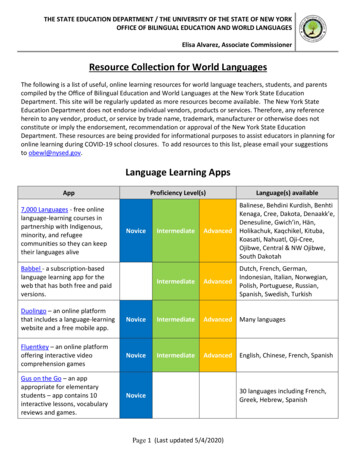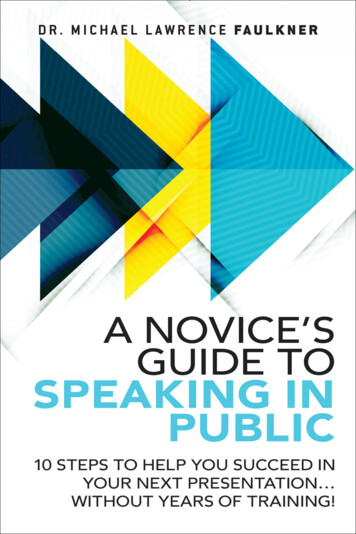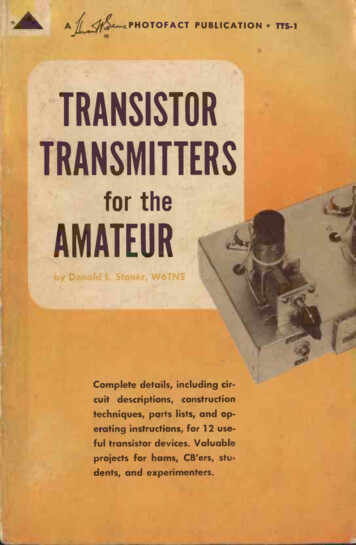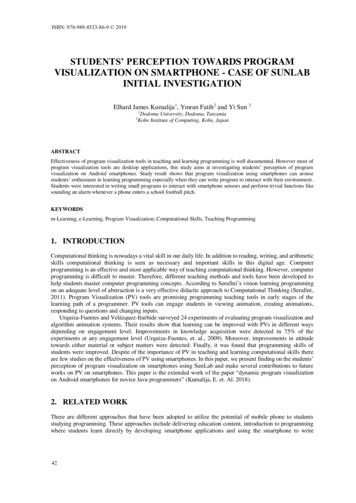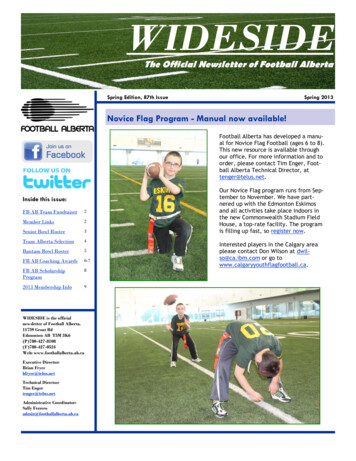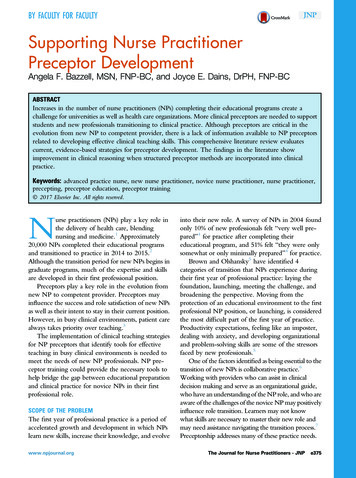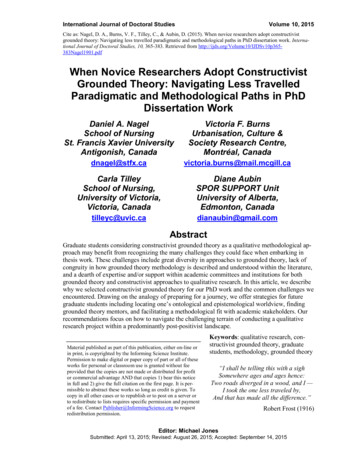
Transcription
International Journal of Doctoral StudiesVolume 10, 2015Cite as: Nagel, D. A., Burns, V. F., Tilley, C., & Aubin, D. (2015). When novice researchers adopt constructivistgrounded theory: Navigating less travelled paradigmatic and methodological paths in PhD dissertation work. International Journal of Doctoral Studies, 10, 365-383. Retrieved from dfWhen Novice Researchers Adopt ConstructivistGrounded Theory: Navigating Less TravelledParadigmatic and Methodological Paths in PhDDissertation WorkDaniel A. NagelSchool of NursingSt. Francis Xavier UniversityAntigonish, CanadaVictoria F. BurnsUrbanisation, Culture &Society Research Centre,Montréal, arla TilleySchool of Nursing,University of Victoria,Victoria, CanadaDiane AubinSPOR SUPPORT UnitUniversity of Alberta,Edmonton, aduate students considering constructivist grounded theory as a qualitative methodological approach may benefit from recognizing the many challenges they could face when embarking inthesis work. These challenges include great diversity in approaches to grounded theory, lack ofcongruity in how grounded theory methodology is described and understood within the literature,and a dearth of expertise and/or support within academic committees and institutions for bothgrounded theory and constructivist approaches to qualitative research. In this article, we describewhy we selected constructivist grounded theory for our PhD work and the common challenges weencountered. Drawing on the analogy of preparing for a journey, we offer strategies for futuregraduate students including locating one’s ontological and epistemological worldview, findinggrounded theory mentors, and facilitating a methodological fit with academic stakeholders. Ourrecommendations focus on how to navigate the challenging terrain of conducting a qualitativeresearch project within a predominantly post-positivist landscape.Material published as part of this publication, either on-line orin print, is copyrighted by the Informing Science Institute.Permission to make digital or paper copy of part or all of theseworks for personal or classroom use is granted without feeprovided that the copies are not made or distributed for profitor commercial advantage AND that copies 1) bear this noticein full and 2) give the full citation on the first page. It is permissible to abstract these works so long as credit is given. Tocopy in all other cases or to republish or to post on a server orto redistribute to lists requires specific permission and paymentof a fee. Contact Publisher@InformingScience.org to requestredistribution permission.Keywords: qualitative research, constructivist grounded theory, graduatestudents, methodology, grounded theory“I shall be telling this with a sighSomewhere ages and ages hence:Two roads diverged in a wood, and I —I took the one less traveled by,And that has made all the difference.”Editor: Michael JonesRobert Frost (1916)Submitted: April 13, 2015; Revised: August 26, 2015; Accepted: September 14, 2015
When Novice Researchers Adopt Constructivist Grounded TheoryIntroductionDetermining a research focus, defining a research question, selecting an appropriate methodological approach to address the question, and, finally, implementing the research project in PhD dissertation work are exciting and daunting parts of the academic journey. While much of this scholarly road has been well-travelled by doctoral students before us, our path diverged to one lesstraveled—akin to Frost’s poem—when we selected a constructivist grounded theory (ConGT)approach over more common forms of qualitative research, including established grounded theory(GT) methodologies. Selecting GT as a qualitative research approach has been equated to navigating terrain (Hunter, Murphy, Grealish, Casey, & Keady, 2011) and as being a “long walkthrough a dark forest” (Wu & Beaunae, 2014, p. 249). In choosing ConGT, we similarly foundourselves weaving through a myriad of paths in a landscape of varied and divergent perspectivesof ontological and epistemological philosophies on GT, requiring navigational skills we wouldnot have anticipated at the outset of our dissertation work.In reflecting on our respective dissertation journeys, from early proposal development through tothe latter stages of our research processes, each of us realized that we had encountered challengesin having adopted ConGT. Fundamental and historic tensions between positivism/post-positivismand constructivism as described by Guba and Lincoln (1994) seemed to overarch many of thesechallenges, playing out amongst the various GT traditions and within our respective learning environments. We encountered differences of opinion with PhD mentors and other GT researchers,either because of differing paradigmatic inclinations or lack of agreement amongst establishedGT methods and procedures. Further, we often had difficulty distinguishing clearly articulatedexamples of ConGT and other GT research in the literature as methodological approaches ratherthan merely analytical frameworks in qualitative data analysis (QDA).In reviewing literature to determine whether our experiences were unique, we found little writtenon PhD students in the dissertation process and even less information on graduate students utilizing GT, specifically ConGT. Thus, our purpose in this article is to illuminate some of the divergent paths and hurdles we faced navigating the use of ConGT and to highlight key learning experiences from our research processes. We begin with an overview of our backgrounds and rationale for having selected ConGT as our methodological approach, and present some of the barriers, challenges, and facilitating factors encountered along the path “less traveled by.” We contrast and contextualize our experiences with our understanding of constructivism, GT and ConGTfrom the literature and offer thoughts and strategies for consideration by future graduate studentscontemplating use of ConGT in dissertation work. Our perspectives may also inform the broaderacademic community, such as supervisors and committee members, who strive to support graduate students using ConGT in dissertation work.Orientating Ourselves:A Compass Heading Towards ConGTA major consideration at the beginning of our respective research processes was selecting amethodological approach that (a) was appropriate to answering our research question, (b) resonated with the philosophical values for knowledge development within our disciplines, and (c) fitour personal beliefs, values, and goals. With respect to our individual research questions, each ofus had found gaps in knowledge related to our phenomenon of interest and lack of theory development in our areas of focus when developing our proposals. Qualitative inquiry is recognized asan appropriate approach for when little is understood of phenomena and can be used inductivelyto develop theory (Creswell, 2013; Polit & Beck, 2012). Thus, in consultation with our respectivesupervisors and committee members, a decision was negotiated to employ a qualitative methodological approach for our studies. Further, each of us believed that social interactions and process-366
Nagel, Burns, Tilley, & Aubines underpinned the phenomenon we sought to understand in our respective doctoral projects. Foreach author this was the following: DN - nurses knowing the person in a virtual environment; VB- pathways into homelessness for older adults; CT - transitions of internationally educated nursesinto Canadian practice settings; and DA - psychological impact of mistakes on health professionals. Since GT is recognized as a suitable methodology to gain an understanding of underlyingsocial processes associated with a phenomenon (Charmaz, 2014; Corbin & Strauss, 2008; Glaser& Strauss, 1967), we concluded that GT methodology best fit our respective research questions.GT originated with Glaser and Strauss (1967), whose foundational work shifted the focus fromthe dominant deductive and hypothesis-testing approach of knowledge development to an inductive, theory building mode of inquiry grounded in data (Charmaz, 2014; Creswell, 2013; Glaser &Strauss, 1967). Since the initial rendering of GT, there have been a number of variations of thismethodology that reflect different ontological and epistemological perspectives of GT (Charmaz,2014; Morse et al., 2009). Glaser continued to develop what he calls classic grounded theory thatemphasizes an objective stance and emergent discovery of theory from the data (Glaser, 1978;Holton, 2007). Strauss and Corbin (1990) collaborated to develop qualitative analysis informedby Chicago School pragmatism and philosophies of symbolic interactionism (Charmaz, 2014;Corbin & Strauss, 2008). Charmaz (2000, 2006) proposed an approach to GT that overtly embraced a constructivist stance in qualitative inquiry, including co-construction of knowledge withparticipants and recognition of interpretation in analysis. Common to all approaches to GT arestrategies of theoretical sampling, constant comparison, coding, and memo writing (Charmaz,2014; Corbin & Strauss, 2008; Glaser, 1978). However, as we will elaborate later, there are manydifferences in philosophical perspectives to the various approaches to GT and in how methods areemployed between the forms of GT.We represent three disciplines from four different Canadian academic institutions and our areasof focus coincidentally have connections in the broad realm of healthcare. For three of us, ourdisciplines are practice oriented (i.e. social work and nursing) that involve direct care to individuals and are mandated to be evidence informed. For all of us there has been an emphasis on qualityresearch, and, for most of us, there was a historical predisposition within our disciplines for postpositivist approaches to scientific inquiry. Although quantitative research has been more prevalent in most of our academic institutions, we found that supervisors and mentors generally hadfamiliarity with GT, particularly that of Glaser and Strauss. This is not surprising, since GT hasbecome more widespread in many disciplines and due to the perception of rigor that Glaserianand Straussian forms of GT provide.Before selecting ConGT as best suited for our respective study foci and research questions, eachof us had identified our paradigmatic inclinations as being constructivist with respect to researchand knowledge development. First, we all believe that perception of reality varies between individuals, and there are pluralities of reality experienced by different people exposed to the samephenomenon. Further, we believe a singular truth can neither be objectively appreciated nor directly measured given differing perceptions of people and the complex nature of interpretingmeanings of phenomenon; we hold this particularly applies to phenomena in the realm of socialsciences and healthcare where our research is situated. This aligns with the constructivist paradigm, where subjectivity is embraced from an epistemological stance and where multiple realitiesare accepted in the construction of knowledge during the research process (Guba & Lincoln,1994; Sandelowski, 1993).We also believe participants’ meanings of phenomena are not only shaped through social interactions, but are contextual and change over time. This is in keeping with Blumer’s (1969) articulation of symbolic interactionism, which is recognized as the philosophical foundation to GT (Bryant & Charmaz, 2007; Charmaz, 2014; Corbin & Strauss, 2008). As well, each of us holds thatsocial construction of meaning is heavily influenced by the interpretive nature inherent to social367
When Novice Researchers Adopt Constructivist Grounded Theoryinteractions, which is amenable to and congruent with constructivist lines of inquiry. In the second edition of her book, Charmaz (2014) recognized the inescapable feature of interpretationwhen undertaking theory development in GT, an element we believe integral to our roles as constructivist qualitative researchers. Building on previous articulations of GT (Glaser & Strauss,1967; Strauss & Corbin, 1990) Charmaz defines ConGT as:A contemporary version of grounded theory that adopts methodological strategies such ascoding, memo-writing, and theoretical sampling of the original statement of the methodbut shifts its epistemological foundations and takes into account methodological development in qualitative inquiry occurring over the past fifty years. (p. 342)Charmaz’s (2014) ConGT draws on analytical frameworks of both Glaserian and Straussian traditions, but honours the flexibility of researchers co-constructing theoretical explanations of phenomenon with participants. For three of us, this flexibility was seen as important since dynamicinteraction with participants was integral to either illuminating social justice issues or enhancinghuman agency, both of which can be accommodated in ConGT (Charmaz, 2011, 2014). ConGTalso acknowledges the researcher’s paradigmatic orientation and experience brought a priori tothe research project and encourages use of reflexivity by the researcher during the research process (Charmaz, 2014). As reflexivity is core to practice-based professions, this attribute ofConGT was seen by us as complementary to the nature of our disciplines. Overall, the philosophical underpinnings of ConGT and the methodological processes described by Charmaz fit withour research questions, disciplinary grounding, dissertation goals, and personal world views.Meeting along the PathThe catalyst for this paper was our participation in the Grounded Theory Club based out of theUniversity of Victoria, British Columbia (Schreiber, 2001), a virtual web-based twice monthlymeeting between faculty and graduate students from various disciplines across Canada and theUnited States. Work of members within the Club represents predominant traditions of GT, including those of Glaser, Strauss and Corbin, and Charmaz, and provides a supportive environment todiscuss GT philosophies, compare methodological approaches, and receive or provide feedbackin dissertation and research work. For us, while we were trying to grasp and make meaning of thevarious perspectives of GT, the Grounded Theory Club has provided a sense of connection thatenhanced our knowledge, allowed us to become more confident in our understandings of GTmethodology, and helped lessen the sense of isolation experienced in the PhD trajectory. Evenwithin this forum there can be passionate divergence in perspectives on methodological aspects ofGT and application of methods and procedures from ontological and epistemological viewpoints,and privileging of one GT tradition over others.In sharing our experiences using ConGT, we realized other members had faced similar challengesin their PhD dissertation processes; this brought the four of us together to compare insights andlearning using ConGT in our research, particularly in the context of our respective academic environments. Through conversations and subsequent work on this manuscript, we identified commonhurdles, divergence in philosophical approaches and external influences that have shaped our individual educational experience, some of which relate to the history of our disciplines and ourrespective academic institutions. We also shared similar strategies and ways to navigate the sometimes unclear and windy paths of dissertation work using ConGT that might benefit future graduate students and the novice researcher.In our review of the literature we found no articles specific to the experiences and challenges ofPhD students using ConGT, and very little written in relation to the use of GT by graduate students more generally. A search of CINAHL, Embase OVID, PsychInfo and Medline databases upto October 2014 using key search terms of graduate students, qualitative research and grounded368
Nagel, Burns, Tilley, & Aubintheory yielded 457 articles. These articles mainly focused on doctoral students reporting researchresults or were related to GT methodology in dissertation work. However, we found two articlesof doctoral students using GT that captured similar experiences to ours: Hunter et al. (2011)through our literature review and Wu and Beaunae (2014) through direct contact with Dr. KathyCharmaz (personal communication, October 11, 2014).Standing at the Crossroads andTaking the Path Less TravelledWu and Beaunae’s (2014) metaphor for their experience with GT and Hunter et al.’s (2011) decision-making process in selecting GT resonated with us as they reflected some of the challengeswe faced in our own journey. Examples of these challenges included distinguishing the paradigmatic attributes of main GT approaches, lack of clear articulation of methods and procedures(e.g., coding and analysis) in ConGT, and the necessity for us to familiarize other individuals involved in our dissertation work, such as supervisors and committee members, with ConGT methodology. As we progressed through the various stages of our research work, we continually grappled with methodological issues and returned often to what we see as the ConGT Crossroads forPhD Students (see Figure 1) to re-orient ourselves on the dissertation journey.Figure 1. The ConGT Crossroads for PhD Students.By the time we had progressed to development of our proposals and started our fieldwork, werealized that each of us had individually covered much terrain and navigated a maze of key decision points without benefit of a clear path or mentor expertise in ConGT. Although there were369
When Novice Researchers Adopt Constructivist Grounded Theorymany reference points to orientate ourselves along the way, such as seminal texts by key authors,we were often led astray by the vagueness and disagreement in the literature. In reflecting on, andsynthesising, our collective experiences with ConGT, we mapped out some of the obstacles andunanticipated detours we encountered and categorized these challenges into three broad themes:1) Traversing the Topography of Paradigms and Research Traditions, 2) Crossing the Great GTDivide and 3) Bridging the Gap(s) Within and to ConGT.Our preface on paradigmsBefore speaking to the three themes, we wish to be clear that we are not taking a position thatadopting one particular paradigm is more correct or that there is a failing of any institution orschool in being predisposed to positivism/post-positivism. We do, however, agree with Staller’s(2012) position that paradigmatic influences shape the culture of academic environments and favour certain types of research, which can have an impact on educational preparation and researchwork of graduate students. We firmly believe that all paradigms play an important part in the development of knowledge for disciplines, and academic preparation of graduate students shouldinclude a balanced appreciation of all paradigms, grounding in various research traditions, andsupport in the academic environment to promote respect and inclusion of the diverse contributions of paradigms and research traditions to science.Traversing the Topography of Paradigms and ResearchTraditionsGuba and Lincoln (1994) proposed that the metaphor of “paradigm wars” described in qualitativeresearch by Gage (1989) is “undoubtedly overdrawn” (p. 116). While it would appear constructivist approaches are becoming more widely accepted, we suggest that the battle for recognitionand unconditional acceptance still plays out regularly in most academic fields. In selectingConGT, we often encountered resistance and some conflict having a paradigmatic leaning thatdiffered with that of mentors, program curricula, the institution’s Faculty of Graduate Studies,and ethics boards. This manifested through such dynamics as disagreements in analytical processes or adapting ConGT methods to fit institutional requirements thereby compromising ourconstructivist principles. In choosing constructivism, an alternative methodological approach tothe predominant research tradition of our post-positivist educational settings, our challenges andhurdles seemed primarily related to paradigmatic and philosophical differences between us andinstitutional stakeholders. As we discovered, learning environments that are preferential to objectivist epistemological approaches made it particularly challenging to be constructivist in practiceand completely faithful to the tenets of ConGT. Often we felt pressure to conform our intendedapproach to the dominant norms of institutional stakeholders; given post-positivist influences inour learning environments, we often experienced what we describe as a form of epistemologicaloppression. Some specific challenges we faced have included the following: a) biases inherent tothe institution and program of study; b) selection of supervisor(s) and committee; c) the depth ofliterature review required for GT research and imposition of an a priori theoretical framework;and d) forcing of concepts in analysis.Bias inherent to the institution and program of studyAt a program level, the philosophical and research methodology preparation of students, or lackthereof, played a significant role for us in navigating ConGT. For two of us, the course work inour academic programs provided a solid philosophical foundation in the overarching paradigmsand specifically addressed epistemological and ontological aspects of knowledge development.However, the other two had to negotiate this critical element independently through reading, peerseminars, and forums such as the Grounded Theory Club, and with little or no guidance in370
Nagel, Burns, Tilley, & AubinConGT within their program. We contend a deep and rich understanding of conceptualknowledge that attends to paradigmatic influences on knowledge development is foundational togood empirical research and is essential to the philosophical base of PhD education. Such conceptual knowledge and foundational preparation can facilitate the doctoral student’s capacity to appreciate and evaluate epistemological and ontological underpinnings of the various GT traditions,to critically review associated literature and be prepared to defend adoption of ConGT (Staller,2012).Closely aligned with developing a philosophical foundation is another cornerstone of PhD education: preparation in, and receiving support for, a chosen research methodology. In comparing ourprograms of study, it seemed evident the overarching paradigmatic inclination of the schools wasreflected in curriculum design and course availability. One author had a qualitative methodologycourse as a requisite requirement with quantitative research in the program of study, and anotherwas able to choose just a qualitative research course in support of dissertation work. However,one author had to choose a qualitative course outside of the program as only quantitative courseswere offered in the program, while for the remaining author qualitative research was an optionalcourse over and above three mandatory quantitative courses. These latter situations highlight theprimacy of post-positive inquiry inherent to some programs and disciplines. This aligns withStaller’s (2012) position that programs where “students are required to take statistics courses butnot qualitative data analysis courses essentially privilege and institutionalize ‘positivist orthodoxy’ through policy” (p. 3). From our perspective, this seems to reinforce a form of epistemological oppression on graduate students who are constructivist oriented.While further empirical exploration of graduate study andragogy might be useful to examine theassociation of curriculum and course design to prevailing paradigmatic viewpoints of a program,it seems logical that such a relationship would potentially impact a student’s ability to utilizeConGT, as well as a program’s capacity to provide appropriate and effective support, includingsupervision and mentorship. It was necessary for two of us to seek required qualitative expertiseoutside the program to support the research process by recruiting committee members from otherdisciplines. We also sought out alternative resources, such as the Grounded Theory Club and theInternational Institute for Qualitative Methodology (IIQM) conference and workshop. We agreewith other authors that independence, motivation, and interdisciplinary perspectives are importantaspects in the educational and professional development of doctoral students, however we alsobelieve it is essential that structural, theoretical and philosophical support is present to supportstudent success (Liechty, Liao, & Schull, 2009; Staller, 2012).Selection of supervisor(s) and committeeOne of the most important decisions a student will make in graduate studies is choosing a supervisor and committee members to help guide the research process. There are a number of considerations a student takes into account, foremost being academic reputation, knowledge, commoninterest, personality, and time commitment among other criteria (Liechty et al., 2009; Nutov &Hazzan, 2011; Ray, 2007). However, if choice of supervisor is based solely on these criteria anddoes not account for paradigmatic alignment or methodological expertise, this can be problematicfor the doctoral student choosing ConGT. While paradigmatic differences can be resolved whenthere is mutual respect for paradigmatic perspective and mentors are supportive to constructivistqualitative research, this may be challenging in programs and institutions that are greatly influenced by deeply entrenched objectivist epistemological assumptions. However willing and ablementors may be, we have experienced the effect of “epistemological unconsciousness” (Staller,2012) where mentors and we, by necessity, would default to stakeholders’ preference of postpositivism.371
When Novice Researchers Adopt Constructivist Grounded TheoryWhile expertise in substantive area, knowledge of research methods, and interpersonal connectionare critical in successful mentoring of any PhD student (Nutov & Hazzan, 2011; Walker, Golde,Jones, Bueschel, & Hutchings, 2008), use of ConGT requires an appreciation of, and support for,a constructivist perspective in relation to GT methodology. Since our personal goal was to befaithful to the tenets of ConGT, a view of ConGT as a methodology and not merely an analyticalframework would have been ideal in supporting our methodological development. However, selection of a supervisor and committee member with a qualitative research background, specifically for GT (Glaser, 2014), and a constructivist philosophy may not be possible in the program ofmany disciplines. For instance, one author started in a program with a strong post-positivist culture and established quantitative research tradition where there was only one tenured professor onfaculty formally prepared in qualitative methodology. While supportive of constructivist approaches to inquiry, this faculty member was not available as either supervisor or committeemember due to high demand of expertise; the author transferred to another university program fora better philosophical fit and necessary GT mentorship.Lack of methodological expertise in a program can pose challenges; however two authors didexperience great receptivity and support in adopting a constructivist approach. One author hadalready been assigned to, and formed a good working relationship with, a supervisor and committee members who were not grounded theorists, but whose philosophical perspectives tended towards a constructivist paradigm. Another author was in a program intentionally not aligned with aparticular paradigm or research tradition and that encouraged students to embrace a more flexiblemethodological approach. The generalist nature of this approach, however, presented other difficulties as there was not sufficient expertise focused in methodology to provide solid mentorshipfor ConGT. To help address the gap of expertise and mentorship for use of ConGT, most of ussought out opportunities at personal expense to attend workshops and seminars, such as the OdumInstitute at University of North Carolina, to work with scholars like Charmaz to develop ourknowledge, skills, and confidence in using ConGT.Requirement of a priori literature review and theoretical frameworksTwo original core principles of GT are to limit exposure to literature prior to beginning researchand not use a conceptual or theoretical framework a priori to inform the research process (Glaser,1998, 2009; Glaser & Strauss, 1967; Hunter et al., 2011). The rationales for these constraints areto minimize researcher bias during the data collection and analytical processes and to help minimize imposition of preconceived conceptualizations influencing the theory development (Charmaz, 2006, 2014; Glaser, 1978, 2012). With respect to the first principle, a priori grounding inliterature has been recognized as being virtually inescapable since all researchers come to thefield of inquiry with some level of exposure to literature; to this end, there has been more acceptance to literature reviews in advance of GT research (Bryant & Charmaz, 2007; Charmaz,2006, 2014). For PhD students, in-depth literature reviews are usually a requirement in coursework, preparation for comprehensive examinations, and development of research proposals; thesereviews are an expectation of supervisors and the institutions to demonstrate a student’sknowledge in the field and provide adequate background for research ethics board [REB] approval (McGill University, 2015; University of Ottawa, 2012; University of Victoria, 2014). Further,granting agencies for scholarships, fellowships, and research funding require substantial literaturereviews to support elements of the research process as part of the application process (Glaser,1998; Wu & Beaunae, 2014).However, a
arly road has been well-travelled by doctoral students before us, our path diverged to one less traveled—akin to Frost's poem—when we selected a constructivist grounded theory (ConGT) approach over more common forms of qualitative research, including established grounded theory (GT) methodologies.
